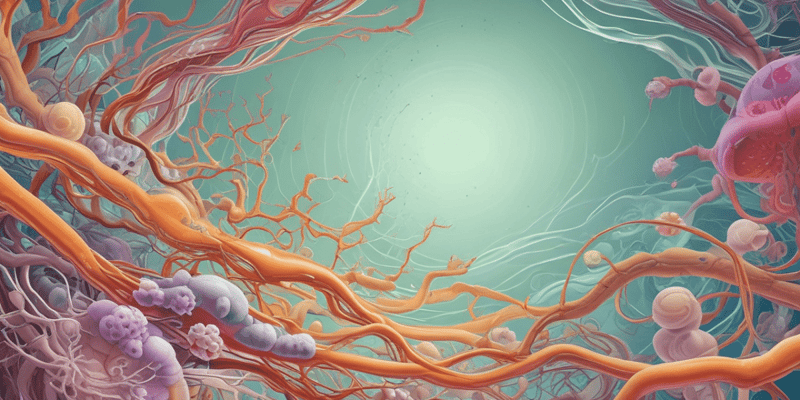Podcast
Questions and Answers
What does Kurzweil's Law suggest about the rate of technological change in the twenty-first century compared to the twentieth century?
What does Kurzweil's Law suggest about the rate of technological change in the twenty-first century compared to the twentieth century?
How are sociotechnical imaginaries defined?
How are sociotechnical imaginaries defined?
What is the main focus of the discussion regarding historicism in the provided content?
What is the main focus of the discussion regarding historicism in the provided content?
Which aspect is NOT mentioned in relation to cognitive effort and delegation?
Which aspect is NOT mentioned in relation to cognitive effort and delegation?
Signup and view all the answers
What does the law of accelerating returns predict concerning technological progression?
What does the law of accelerating returns predict concerning technological progression?
Signup and view all the answers
What does Henry Adams suggest thought in terms of Ether primarily represents?
What does Henry Adams suggest thought in terms of Ether primarily represents?
Signup and view all the answers
What metaphor does Henry Adams use to illustrate the potential of human thought to control natural forces?
What metaphor does Henry Adams use to illustrate the potential of human thought to control natural forces?
Signup and view all the answers
According to the content, how has the technological change rate evolved from 1000 AD to the 20th century?
According to the content, how has the technological change rate evolved from 1000 AD to the 20th century?
Signup and view all the answers
What is Kurzweil's Law concerning the rate of technological progress?
What is Kurzweil's Law concerning the rate of technological progress?
Signup and view all the answers
What is the significance of the phrase 'paradigm shift times are halving every decade'?
What is the significance of the phrase 'paradigm shift times are halving every decade'?
Signup and view all the answers
What implications does the acceleration of technological progress have for the 21st century according to the passage?
What implications does the acceleration of technological progress have for the 21st century according to the passage?
Signup and view all the answers
Which of the following best describes the change in technological progress from the 19th century to the early 20th century?
Which of the following best describes the change in technological progress from the 19th century to the early 20th century?
Signup and view all the answers
What overarching theme can be derived from Henry Adams' perspective on thought and technological progress?
What overarching theme can be derived from Henry Adams' perspective on thought and technological progress?
Signup and view all the answers
What is one definition of history presented?
What is one definition of history presented?
Signup and view all the answers
Which of the following describes historicism?
Which of the following describes historicism?
Signup and view all the answers
What does technological determinism claim?
What does technological determinism claim?
Signup and view all the answers
Which factor is NOT part of the social forces described in historicism?
Which factor is NOT part of the social forces described in historicism?
Signup and view all the answers
What is one view of history discussed?
What is one view of history discussed?
Signup and view all the answers
What does the phrase 'events are anything that happens' imply about historical significance?
What does the phrase 'events are anything that happens' imply about historical significance?
Signup and view all the answers
According to the context provided, how is history viewed in relation to technology?
According to the context provided, how is history viewed in relation to technology?
Signup and view all the answers
What is NOT a characteristic of the cyclical view of history?
What is NOT a characteristic of the cyclical view of history?
Signup and view all the answers
Study Notes
Lecture 4: Technology and History
-
This lecture covers technology's relationship with society and history
-
Specific topics within the lecture include:
- Where is History?
- Historicism
- Sociotechnical Imaginaries of the Future
- Time and Technology
-
The lecture references different perspectives on history, including:
- History as a collection of individual and unique events
- History viewed as a continuous progression
- History viewed as cyclical patterns
-
The lecture discusses various technologies with impacts on society, including:
- Regenerative medicine
- Brain sciences
- Robotics
- Genetic engineering
- Cognitive augmentation
- Artificial intelligence
- Synthetic biology
- Ubiquitous computing
- Nanotechnologies
-
Historicism is defined as an approach viewing prediction as discovering underlying patterns and trends in history
-
This approach contrasts with other perspectives on history
-
It also discusses forces impacting history, such as class, race, and economics
-
These forces are connected to technology's evolution.
Technological Determinism
- Technology is the force driving social and cultural events
- History is a sequence of technological revolutions.
- Examples of eras in history associated with this theory:
- Industry 1.0 (mechanization)
- Industry 2.0 (mass production)
- Industry 3.0 (automation)
- Industry 4.0 (cyber-physical systems and networks)
- Examples of eras in history associated with this theory:
Henry Adams, The Rule of Phase Applied to History
- A discussion of Henry Adams’ work on the concept of 'the rule of phase applied to history'
- Early stages of history are characterized by extended periods like 8 billion years
- Later, more rapid shifts and changes are noted
- Phases of history are presented with lengths and energy outputs. Examples included:
- Instinctual Phase
- Religious Phase
- Mechanical Phase
- Electrical Phase
- Ethereal Phase
Kurzweil's Law Curve
- The accelerating rate of computational power growth
- Predicting a future 'singularity', when human intellect is mirrored in machines
- The concept of exponential increases in computation capabilities over time
Countdown to Singularity
- Data visualization showing the rapid increase of technology capabilities over time
- A linear timeline representation of technological breakthroughs throughout history
Moore's Law
- Moore's Law, which describes the doubling of transistors on microchips every two years
- The rapid pace reflects history and technological changes over time
Sociotechnical Imaginaries of the Future
- Visions for future sociotechnical systems
- Societal forms in the future are possible due to technological advances
- These visions may be imagined and publicly performed
Time and Technology
- Discusses the concept of delegation of physical efforts to machines, leading to changes in cognitive work
- Past, present and future technological impacts are considered
- Includes discussions on "where were you a year ago?".
The Growth of Artificial Intelligence
- The rate of development in AI and its projections for the future
- Charts visualize the exponential growth in AI capabilities.
Understanding Different Perspectives
- An overview of various figures and perspectives on the future of technology (e.g., individuals working on AI) and their arguments
- Different views of AI, technology's role, and its potential impact on society
Conceptual Framework For History
- The idea that history progresses from prehistory (no ICTs) to history (ICTs in existence), and then to hyperhistory (high ICT dependence)
First-order/Second-order/Third-order Technology
- These are different categories of technology in relation to humanity and nature.
- First-order: Humanity → Technology → Nature
- Second-order: Humanity → Technology → Technology → Nature
- Third-order: Feedback loops, complicated systems
- Concepts of "the modern smart home" and connected devices as detailed examples
The Final Destination: Death by GPS
- The study of accidents related to GPS technology, its role in forensic science, and the legal considerations for such accidents
Studying That Suits You
Use AI to generate personalized quizzes and flashcards to suit your learning preferences.






